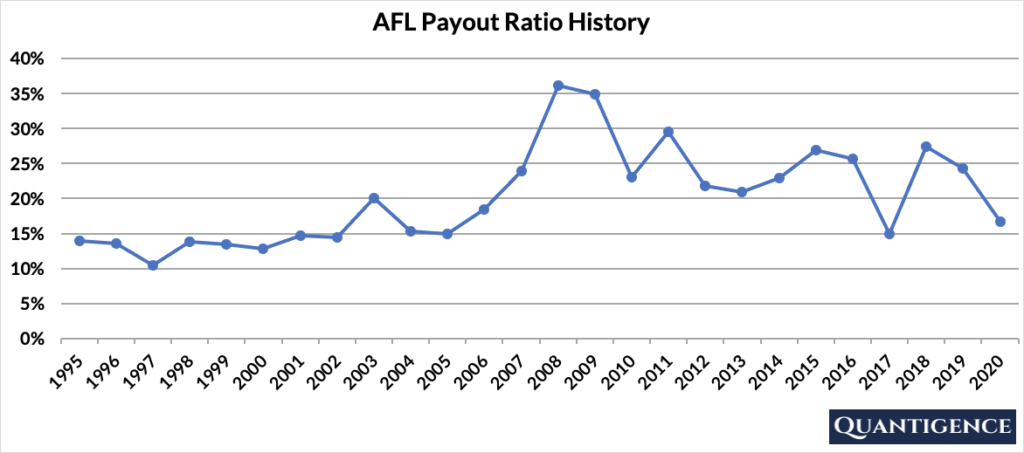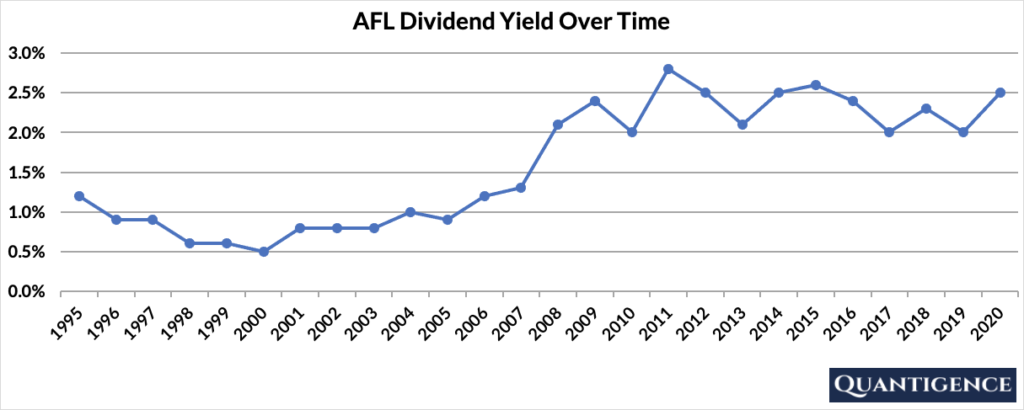Aflac Incorporated (NYSE: AFL) provides supplemental health and life insurance products. It operates through two segments, Aflac Japan and Aflac U.S. with revenues skewed towards Japan.
| Segment | 2020 Revenue (in billion USD) | Revenue % |
| Aflac Japan | 15.371 | 70% |
| Aflac U.S. | 6.565 | 30% |
Aflac’s Dividend History and Payout Ratio
AFL has a track record of paying and increasing dividends for 39 consecutive years, a record that the company will likely feel highly obligated to maintain. In 2020, the company paid out a mere 17% of its profits in the form of dividends. This low payout ratio enables the company to keep growing its dividend in the future, even if earnings are not growing or temporarily declining. In looking at the company’s payout ratio history over the past 25 years, it’s been remarkably stable having never exceeded 36%.

When Does Aflac Pay Dividends?
AFL pays a quarterly dividend typically announced in the last weeks of January, April, July, and October (the first quarterly dividend announcement sometimes happens in the first days of February). The ex-dates are around the 20th of the following month, and payments are made on the first days of the months after that (March, June, September, and December).
What is Aflac’s Dividend Yield?
Dividend yield (the annual dividend paid divided by the share price) shows the 1-year return on a stock purchase in the form of dividends. In 2020, AFL had a dividend yield of 2.5%, higher than our investment universe average of 1.8%. The stock’s historical yield has been moving between 0.5% and 2.8% with an average of 1.6%.

Aflac’s Dividend Growth Rate
AFL has grown its dividend payout by an average of 7.0% every year for the past 10 years. However, that growth seems to be accelerating a bit lately with the annual dividend increase averaging 7.2% over the last five years. Below you can see the effect a 10-year growth rate of 7.0% has on AFL’s dividend assuming a starting yield of 2.5%.
| Years | Dividend Growth | Yield Calculation | Yield % |
| Year 0 | 0% | 2.50% | 2.5% |
| Year 1 | 7.00% | 2.5%*1.07 | 2.68% |
| Year 2 | 7.00% | 2.5%*(1.07)^2 | 2.86% |
| Year 3 | 7.00% | 2.5%*(1.07)^3 | 3.06% |
| Year 4 | 7.00% | 2.5%*(1.07)^4 | 3.28% |
| Year 5 | 7.00% | 2.5%*(1.07)^3 | 3.51% |
| Year 6 | 7.00% | 2.5%*(1.07)^6 | 3.75% |
| Year 7 | 7.00% | 2.5%*(1.07)^7 | 4.01% |
| Year 8 | 7.00% | 2.5%*(1.07)^8 | 4.30% |
| Year 9 | 7.00% | 2.5%*(1.07)^9 | 4.60% |
| Year 10 | 7.00% | 2.5%*(1.07)^10 | 4.92% |
If you bought AFL at a yield of 2.5%, an average 10-year dividend growth of 7.0% means your yield would be 4.92% 10 years from now. This is called “yield on cost,” and shows the yield we’re receiving on the original amount of money we invested.
How Strong is Aflac’s Dividend?
When evaluating dividend stocks, we use our own methodology which is based on Q-scores which consist of seven factors:
- Years paying and increasing dividends
- Market cap
- International sales
- Yield
- Payout ratio
- Five-year dividend growth rate
- Ten-year dividend growth rate
We calculate each of these factors and summarize them in a final proprietary Q-score. To learn more about how we calculate Q-scores, check out our piece on “7 Factors Used to Select Dividend Growth Stocks.”
The Q-score for Aflac Incorporated is presently 18.2, the top Q-score in the “Financials” sector and the eighth-highest Q-score in our dividend growth investment universe. We reward the company for its dividend increase track record, low payout ratio, international sales, and yield. Both five-year and 10-year dividend growth rates look OK as well. The only factor that’s mediocre is AFL’s market cap. As the financial company with the top Q-score, we include Aflac in our final 30-stock dividend growth portfolio.
[optin-monster slug=”ziwrnabndtepsyq0fyai”]


